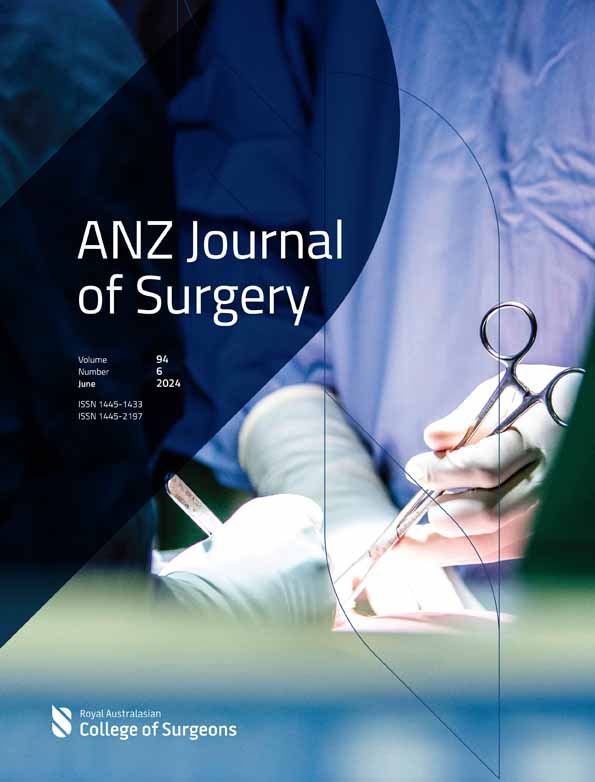Cutting carbon out of surgical care delivery
Andrew Cochrane is an Editorial Board member of the ANZ Journal of Surgery and a co-author of this article. To minimize bias, they were excluded from all editorial decision-making related to the acceptance of this article for publication.
Introduction
As the world passes the 1.5°C warming threshold,1 climate change and its dire consequences for global health are coming into stark focus. In the current issue Leow et al.2 discuss the issue of sustainability in Cardiothoracic surgery. However, it is imperative that the healthcare sector, including all surgeons and specialties, takes a critical look at its practises and commits to decarbonization. The recent years have seen a growing awareness of the environmental impact of healthcare, with calls for decarbonization and sustainability in surgery becoming more urgent. The UK Health Alliance on Climate Change in collaboration with Surgical Colleges across the globe, including RACS, produced the Green Surgery Report3 outlining the current evidence and guidance for reducing the environmental impact of surgical care. RACS was also the first College to endorse the Doctors for the Environment Australia Green College Guidelines,4 an evidence-based guide for Colleges to decarbonise their own activity and prepare their Fellows to deliver care in an environmentally sustainable way. Surgery is not exempt from this requirement to become more sustainable – we must lead this change in our own field if we are to remain at the forefront of innovation, delivering the highest standard of care.
Moving away from single-use devices, gowns and drapes
One area where surgery can make immediate strides towards sustainability is in reducing our reliance on single-use devices. The widespread adoption of disposable equipment does not have a solid evidence base in infection prevention,5 and has been driven by industry, convenience, and short-term cost-shifting. One simple example is that of sterile gowns and drapes – RACS has recently produced a position paper on the safety and environmental benefits of reusable sterile gowns over single use gowns6 which has been endorsed by both the Australian College of Perioperative Nursing (ACORN) and the Australian College of Infection Prevention and Control (ACIPC). We must transition to reusable options where these exist and work with industry to develop reusable options where they are not currently available.
Delivering high value care
Additionally, we must be judicious in our ordering of pre- and post-operative investigations and ongoing surveillance. Unnecessary tests and other low-value care are responsible for up to 40% of the emissions associated with clinical care delivery according to Barratt et al.7 By adopting evidence-based guidelines and protocols, we can streamline our practices and reduce unnecessary resource consumption, all while maintaining high standards of patient care. This includes scrutinizing not only the efficacy of surgical techniques but also their environmental impact. We must be willing to challenge not only traditional practices but also new innovations that are more expensive and wasteful without definitive evidence of patient benefit. The ongoing expansion of robotic surgery without clear evidence of improved patient outcomes over other minimally invasive techniques is a clear example of where the environmental impact of surgical technique should be more carefully considered. It is pleasing to see these environmental considerations, and the importance of life cycle assessment, incorporated into the IDEAL framework for assessing surgical robotic technology8 and we will hopefully see environmental considerations incorporated into Australia's Health Technology Assessment processes9 for approving all new medicines and devices in the near future.
Environmental determinants of health
Moreover, we must leverage our position in society to advocate for stricter controls on environmental factors that contribute to disease. Air pollution, particularly from fossil fuel burning, remains a significant contributor to cardiorespiratory illness worldwide. There are an estimated 8.8 million deaths per year globally due to air pollution10 – compared to 7.2 million due to tobacco.11 This contribution of air pollution to cardiovascular disease risk is now better understood and has been found responsible for 800 000 deaths per year in Europe,12 and we now know that there has been a 30% increase in lung cancer attributable to air pollution since 2017.13 In Australia, we now have strong data demonstrating the annual burden on our health from ongoing fossil fuel use and the most visible consequences of global warming. Our coal-burning power plants are responsible for 800 deaths per year14 and the 2019/2020 bushfires which we hope not to see repeated this year were responsible for 170 deaths linked to increased levels of PM 2.5 particles in the air.15 As healthcare professionals, we have a responsibility to speak out against practices that harm both human health and the environment and to advocate for policies that hasten our transition away from fossil fuels as a source of power for stationary energy and transport.
Conclusion
Surgery must embrace sustainability as a core principle of practice, moving away from single-use devices, taking a judicious approach to resource utilization and ensuring that we deliver high-value low-carbon healthcare. Just as importantly we must advocate for policies that reduce the impact of fossil fuels on the health of our patients and planet.




